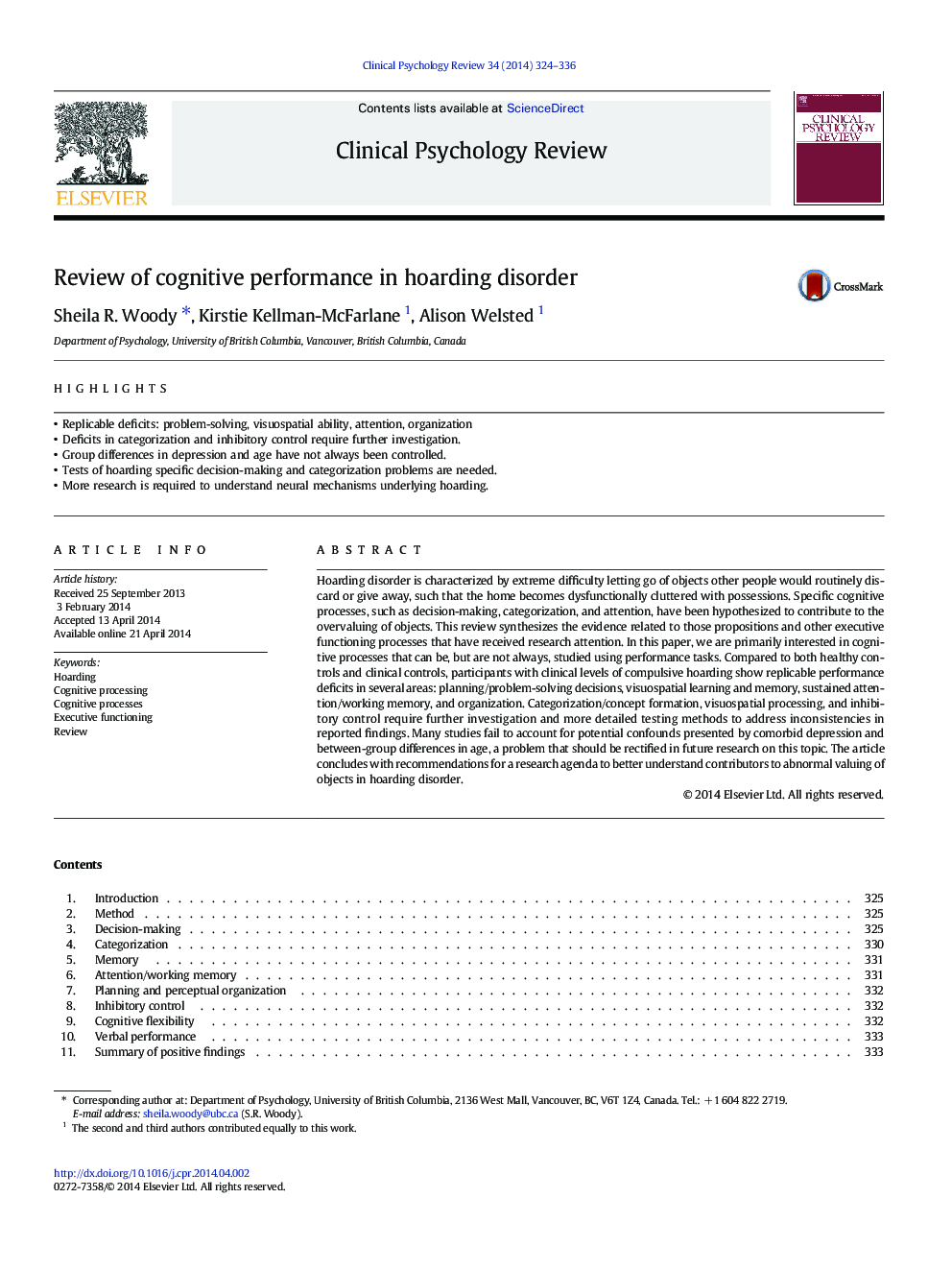| کد مقاله | کد نشریه | سال انتشار | مقاله انگلیسی | نسخه تمام متن |
|---|---|---|---|---|
| 10445698 | 916570 | 2014 | 13 صفحه PDF | دانلود رایگان |
عنوان انگلیسی مقاله ISI
Review of cognitive performance in hoarding disorder
ترجمه فارسی عنوان
بررسی عملکرد شناختی در اختلال هورمونی
دانلود مقاله + سفارش ترجمه
دانلود مقاله ISI انگلیسی
رایگان برای ایرانیان
کلمات کلیدی
هواردینگ، پردازش شناختی، فرایندهای شناختی، عملکرد اجرایی، مرور،
ترجمه چکیده
اختلال هورمونی با دشواری شدید در رها کردن اجسام دیگر مشخص می شود که به طور معمول از بین می روند و یا از بین می روند، به طوری که خانه ها به طور غیرمستقیم با اموال درهم آمیخته می شوند. فرآیندهای شناختی خاص مانند تصمیم گیری، طبقه بندی و توجه، فرض شده اند که به افزایش ارزش گذاری اشیا کمک می کند. در این بررسی، شواهد مربوط به آن گزاره ها و سایر پروسه های عملکرد اجرایی که توجه پژوهشگران را به خود جلب کرده است، سنتز می کند. در این مقاله، ما در ابتدا علاقه مند به فرآیندهای شناختی هستیم که می تواند باشد، اما همیشه با استفاده از وظایف عملکرد بررسی نمی شود. در مقایسه با هر دو کنترل سالم و کنترل بالینی، شرکت کنندگان با سطوح بالینی تجمع اجباری، نقص عملکرد قابل تقلیل در چندین بخش را نشان می دهند: تصمیم گیری / تصمیم گیری در مورد مسائل حل مسئله، یادگیری فضایی و حافظه، حافظه پایدار توجه / حافظه کاری و سازمان. شکل گیری طبقه بندی / مفهوم، پردازش تصاویر متحرک و کنترل مهار کننده، نیازمند بررسی بیشتر و روش های دقیق تست برای رفع ناهماهنگی در یافته های گزارش شده است. بسیاری از مطالعات به دلیل اختلالات بالقوه ناشی از افسردگی همراه با اختلاف بین گروهی در سن، مشکل نیستند که باید در تحقیقات آینده در مورد این موضوع اصلاح شود. مقاله با توصیه هایی برای یک برنامه تحقیقاتی به منظور بهتر درک مفاهیم ارزش گذاری غیر طبیعی از اشیاء در اختلال ذخیره قرار می گیرد.
موضوعات مرتبط
علوم پزشکی و سلامت
پزشکی و دندانپزشکی
روانپزشکی و بهداشت روانی
چکیده انگلیسی
Hoarding disorder is characterized by extreme difficulty letting go of objects other people would routinely discard or give away, such that the home becomes dysfunctionally cluttered with possessions. Specific cognitive processes, such as decision-making, categorization, and attention, have been hypothesized to contribute to the overvaluing of objects. This review synthesizes the evidence related to those propositions and other executive functioning processes that have received research attention. In this paper, we are primarily interested in cognitive processes that can be, but are not always, studied using performance tasks. Compared to both healthy controls and clinical controls, participants with clinical levels of compulsive hoarding show replicable performance deficits in several areas: planning/problem-solving decisions, visuospatial learning and memory, sustained attention/working memory, and organization. Categorization/concept formation, visuospatial processing, and inhibitory control require further investigation and more detailed testing methods to address inconsistencies in reported findings. Many studies fail to account for potential confounds presented by comorbid depression and between-group differences in age, a problem that should be rectified in future research on this topic. The article concludes with recommendations for a research agenda to better understand contributors to abnormal valuing of objects in hoarding disorder.
ناشر
Database: Elsevier - ScienceDirect (ساینس دایرکت)
Journal: Clinical Psychology Review - Volume 34, Issue 4, June 2014, Pages 324-336
Journal: Clinical Psychology Review - Volume 34, Issue 4, June 2014, Pages 324-336
نویسندگان
Sheila R. Woody, Kirstie Kellman-McFarlane, Alison Welsted,
